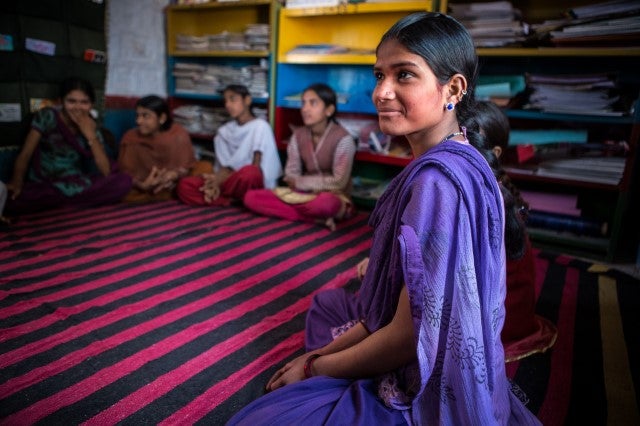‘Some girls have already married early’: Young women at risk of never going back to school in Africa and Asia amid coronavirus crisis
Exclusive: Girl says her family have been telling her to drop out of school ever since lockdown started

Half of girls are at risk of never returning to school in Africa and Asia in the wake of the coronavirus emergency, a troubling report has found.
The study, which polled 24,000 girls, warns that families will prioritise pushing their daughters into marriage at a young age or making them do child labour over returning to education once schools can safely open up.
Room to Read, which helps children in low-income communities develop literacy skills, said teenage girls had already dropped out during the Covid-19 crisis and this was likely to be the direct result of economic hardship.
The study, shared exclusively with The Independent, said financial uncertainty unleashed by the coronavirus crisis increases pressures to find money, which can lead to girls being pushed into child marriage or sex trafficking and other forms of exploitation.
Financial pressures can also result in girls being made to stay home to cook, clean and care for relatives instead of going to school, researchers said.
Almost half of girls said their household had lost income during the public health emergency, while almost one in 10 girls said they had stopped learning since schools shut during the crisis, and a similar proportion said are already anxious they will not be going back to school.
Families in the communities polled can earn less than a dollar a day, so any reduction in income can have a devastating effect.
Heather Simpson, of Room to Read, said: “Financial hardship has long been the number-one cause of girls not receiving an education, that is why the economic impacts of Covid-19 can be so detrimental for gender equality in low-income communities.
“We have heard that some girls have already married early. Financial hardship is the main cause of families choosing to marry their daughters early, so these results must serve as a warning signal to the international community that urgent action is required. We refuse to give up on girls in some of the poorest parts of the world who dream of making a better life for themselves and their communities through the power of education.”
Ms Simpson said substantial progress has been made in supporting girls in low-income communities in recent years, but progress towards reaching gender equality “could be set back decades” by the global public health crisis.
Varuni, a 15-year-old girl in Sri Lanka who the charity works with, had to move to live with her aunt during the lockdown because she had been living in a dangerous home situation due to her alcoholic father being violent. The teenage girl is said to now be learning again and likely to go back to school as lockdown eases.
Urmila, a girl living in Nepal, said her family had been telling her to drop out of school ever since the coronavirus lockdown started. She had been using the family’s only smartphone to do online lessons but her mother and brother said she should give up her education, Urmila said.
While learning has been temporarily interrupted and hampered for most children around the world, researchers note that for millions of children school closures during the lockdown signal a permanent halt to learning.
“An end to reading, an end to learning, and an end to the dream of making positive change in their own lives and communities,” the study adds.
The girls interviewed for the report, which is one of the biggest surveys on girls’ education during the global pandemic, were aged between 15 and 19 years old and living in low-income communities across eight countries spanning from India to Nepal, Sri Lanka, Vietnam, Laos, Cambodia, Tanzania and Bangladesh.
The report says: “As families deal with unprecedented levels of stress, the risk of intra-family conflict and gender-based violence increases, negatively impacting girls’ self-confidence, well-being and ability to negotiate key life decisions.”
A study, carried out by the United Nations’ sexual and reproductive health agency (UNFPA) at the end of April, warned the coronavirus outbreak could stall measures to curb the practice of child marriage and possibly lead to an additional 13 million child marriages in the next decade that could have been stopped.
More than 20,000 underage girls are married every day, research by Save the Children charity from 2017 found.
Join our commenting forum
Join thought-provoking conversations, follow other Independent readers and see their replies
Comments
Bookmark popover
Removed from bookmarks